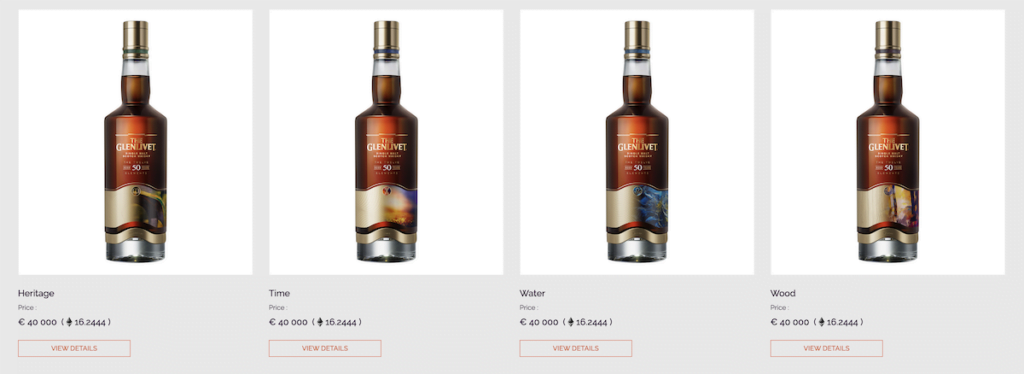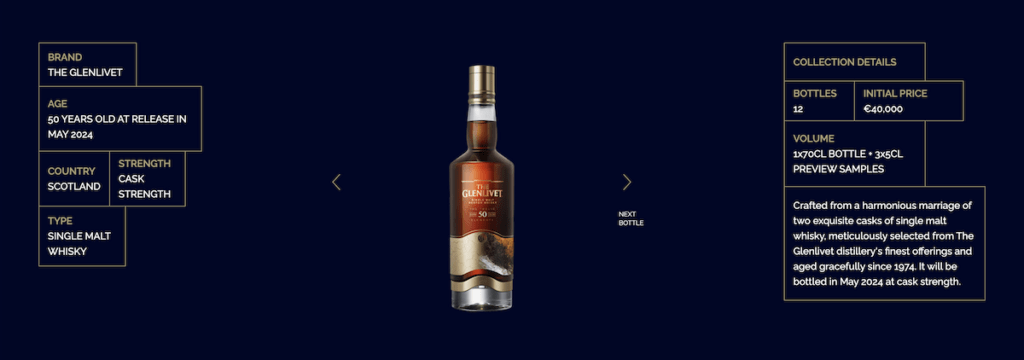The marriage of tradition and technology has reached new heights with the recent announcement from Scotland’s Glenlivet distillery, weaving together the centuries-old craft of whiskey making with cutting-edge NFT and AI innovations. The Twelve Elements Glenlivet NFT collection features 12 bottles from a 50-year-old whiskey collection, complete with AI-generated labels and NFT-backed sales, represents not just a milestone for the distillery but a groundbreaking approach to rare spirit commerce.
Pioneering the Market with a Digital Twist
On February 13, Glenlivet shared its plans to auction 12 bottles from a limited-edition, 50-year-old single malt Scotch collection. This isn’t just any collection, though. The whiskies – which have been aging since 1974 at the Speyside distillery in Scotland – paired the rare vintage with an even rarer digital inclusion: Each bottle features a label designed by a first-of-its-kind AI system, promising a uniqueness matched only by the affluent few who will own these pieces of liquid history.
Glenlivet’s foray into the world of NFTs and blockchain isn’t about keeping up with the trends; it’s about setting them. Despite the high price tag and the exclusivity of the bottles, this is more than a simple luxury sale. It’s an exploration of how technology can enhance and secure the heritage embedded in every drop of the liquid amber that whisky connoisseurs treasure.

The Technological Tapestry of NFTs and AI
The Glenlivet’s AI labels aren’t just pretty designs; they are databases of art information that couldn’t possibly fit on a traditional whisky label. The complexity of the visual and the information it holds can only be fully realized through an augmented reality experience, something made possible through app technology growling in tandem with the whiskey marketplace.
By integrating NFTs, each bottle becomes a digital collectible, a blockchain token that verifies the bottle’s authenticity and unique place in its collection. The integrity of NFTs provides a level of assurance and provenance that could transform the high-end spirits market.
The Whisky Exchange Cabinet, a blockchain-based marketplace, will issue a digital certificate of authenticity and ownership for every bottle sold. In essence, every purchase isn’t just a possession of rare and exquisite whisky; it’s the acquisition of a slice of the future, a tradable digital asset that ties the physical act of drinking to a wider network of technological innovation.

Looking Beyond the Bottle
However, the purpose of Glenlivet’s union with technology isn’t solely to sell whiskey. It’s about setting a precedent for traceability, a concept that’s becoming increasingly vital in the alcohol industry. Buyers want to know not only what they’re buying but where it’s coming from and if it’s the real deal.
The NFTs and AI labels don’t just carry a design or a number; they embed data that includes the origin, age, and rarity of the whisky in a way that is verifiable, secure, and aesthetically pleasing. For the spirits industry, this integration with technology marks a step toward a more sophisticated form of storytelling, giving each bottle a digital museum’s worth of context.
In the larger sphere, this move is another touchpoint where technology interfaces with traditional industries. We’ve seen similar bridging with the art world, where NFTs have become a conduit for digital artists to sell their works, claiming authenticity in a market often besieged with reproductions and fakes. Glenlivet’s integration of NFTs and AI illustrates a growing trend, one where the digital and the tangible not only coexist but where the former empowers the latter, adding new layers of value to goods that have depended for too long on their intrinsic quality alone.
The Timeless Impact of Digital Innovation
Whisky is timeless, a legacy distilled in every bottle, it is perhaps fitting that Glenlivet, a distillery with a remarkable legacy, is the one to make history by being the first to dive into this digitized and decentralized future. The pairing of blockchain with Scotland’s liquid gold sets a precedent that many will watch with great interest.
For the connoisseur eager to participate in this modern twist on a time-honored craft, the 21st of February will mark an opportunity to own a piece of this historical event. For the collective ethos of connoisseurs worldwide, it represents a landmark in the evolution of how we experience and appreciate the finer things.
Technology, it seems, is embarking on a spirited adventure of its own, and it has brought the whiskey world along for the journey. As the first of many forays, Glenlivet’s NFT edition may one day be seen as the watershed moment when technology and tradition not only clinked glasses but fused into a harmonious and potent blend.



